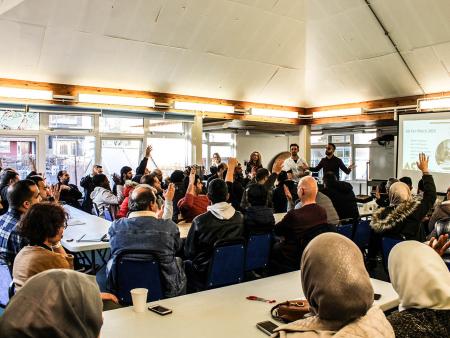
Is ESOL enough in 2020? The gaps in adult education training discussed.
We want to take a little pause and really think about ESOL and training.
Things move quickly in the refugee and migrant training and support sector, support organisations and service providers are always busy trying to get people into work, secure housing and communities so they can become integrated, independent and live the life they want to live. With so much to do, and often not enough resources to do it, taking a critical look at the way things are done and studying the changing landscape of our society can take a backseat.
But sometimes we need to take a pause and really think about whether the way we’ve always done things is in fact the best way. In order for us to succeed as an organisation, and achieve our mission to get refugee and migrant communities the skills they need to gain sustainable employment in the UK, we have to innovate and think about the best way to help people, not just into any job, but into sustainable employment resilient to labour market changes.
We need to ask ourselves: how can we move beyond entry level skills training, and into sustainable career training for the jobs of the future?
Read on to find out why (and how) we can move beyond an ESOL=employability model, and make the case for training in first language…
Does ESOL really lead to sustainable employability?
Learning English as a newly arrived person in the UK may not be THE most important thing a newly arrived person can do to get a sustainable career in the long-term.
This might seem counter-intuitive, but basic English knowledge will only get you as far as getting yourself into a cycle of entry-level jobs, and we don't want that. We want people to grow, we want society to grow with the positive impact a diverse workforce will have.
We’re not saying English isn’t important. But if we only focus and concentrate refugee and migrant training courses on ESOL, once a newly arrived person achieves their ESOL qualifications and maybe an entry-level job, whilst they will have bread on the table, it is most unlikely they will progress to medium or higher level careers. It's not news to note that there aren’t many training opportunities in most entry-level jobs, or even opportunities to develop better communication skills.
At ACH/Himilo one of our aims is to progress our service users beyond entry level jobs, and into medium and higher level careers. The need for this is clear to Richard Thickpenny, ACH Deputy CEO and Business Development Lead:
“ACH was getting beneficiaries into cleaning, security guard and warehousing roles, but this wasn’t enough. We recognised that 75% of refugees who are progressed into entry level jobs never progress, representing a £380,000 loss of potential earnings over a 45-year working life. We have therefore reconfigured services to enable our beneficiaries to secure this integration premium.” – Richard Thickpenny, 2019
Moreover, the classroom-based ESOL teaching format proves to both not meet the demand and be accessible for many people and communities around the country (based on the 2011 census).
A Department of Education Report published in July 2019 surveyed ESOL providers, finding that 98% of English lessons were delivered in-classroom. Whilst this is the preferred method for many, there are people with childcare and care responsibilities or disabilities for which this is inherently exclusionary. Further, 53% of ESOL providers said they found it ‘fairly difficult’ to meet the demand for English classes. What this means in practice is that their can often be long waiting lists for access to lessons.
We don't want people to have to wait, not able to learn because of language. And we don’t want people to only learn English, to get an entry level role, unless this is what a person really wants to do. We want to use the skills people are really good at. We want our service users to have access to choice.
Why wouldn't we want that? And why wouldn’t society want that?
Could first language training lead to better employment opportunities?
Some people already arrive with a set of skills and certifications in various fields. The NHS has a good model of having integrated doctors without perfect English, yet highly competent to treat patients. People coming to the UK will often have skills, ambitions and training they bring with them to the UK, and we are missing out by training people up for low-level jobs outside of people’s skillsets. The NHS recognises the qualifications of doctors and medics from certain countries. But imagine if this could extend to all other sectors?
We need to ask: how can we make more flexible systems so people could learn English in their area of expertise, without having to go around entry-level jobs before they can ever, if ever, get a job to match their field?
Imagine if a person could launch into specific skills training for higher-level employment in their first language as soon as they arrived in the UK, and had an ability to build on knowledge they already had.
Hypothetically, imagine a 20-year old who has studied IT in college before arriving to the UK, but who can’t speak much English. If they entered into a classic ESOL=employability model, this young person could be trained in basic English and IT skills, and perhaps land a job in hospitality once they had a good level of English, entering into the workforce in a precarious job role, with little security. But if they could be offered, for example, a course in coding in their first language, immediately after arriving to the UK, by the time they had a good level of English, they might also have the coding knowledge to apply for a higher level job as a web developer, thus entering a sustainable career pathway with good prospects for training and development.
This would have the potential to add so much to both society and the economy. Imagine 770,000+ more people earning, progressing and integrating into society. How much this would benefit the country and our communities.
In practice: The SEESI project
How could this work in practice? Our SEESI Project is an innovative programme we’re undertaking alongside partners, with EU funding. The SEESI Project asks the question: ‘who is it offering support to refugee and migrant communities?’.
We know from our lived experience that there are people in-communities offering ad-hoc help and support to others – doing informally and voluntarily what a paid support worker would do.
The aim of the SEESI Project is: ‘It designs the learning programme to develop the capability of the SEESI support worker and refugee and migrant service providers to deliver first language counselling services.’
This support work could be given in first language, to people arriving in the UK, without the need for translators. A person could be given essential knowledge for integration and support services in a person’s first language, enabling them to integrate into society more quickly in the long run, once their English language skills had improved.
We are currently running our first ‘Train the Trainers’ course for in-community support workers, to upskill and train our first cohort with the skills to gain a sustainable career in support work, and unlock the confidence of newly arrived people by providing support and training in first-language.
What do you think?
We think creating spaces for learning in a person’s first language means learners can help hack the system, get people learning complex skills for higher-level jobs or entrepreneurship faster and progress more quickly when they do acquire language skills.
There can never be a one-size-fits-all solution to getting people on their integration journey, and successfully entering sustainable employment. Everyone is different and has different needs. For this reason, we think it is time to rethink where training investments go and try to adapt these to create holistic solutions for individuals arriving to the UK.
As the future of work turns more and more towards technology, automation and tertiary employment, inequality will be more and more on the rise. We need to innovate now to make sure our service users can take advantage of labour market trends, and not be left behind.
Does the training provision sector need to radically rethink its approach? Do we need to advocate for more ESOL provision, alongside first language skills training for in-demand jobs?
What do you think? Tell us on Twitter, Instagram, Facebook or Linkedin.
